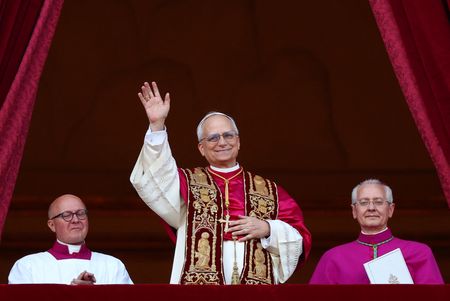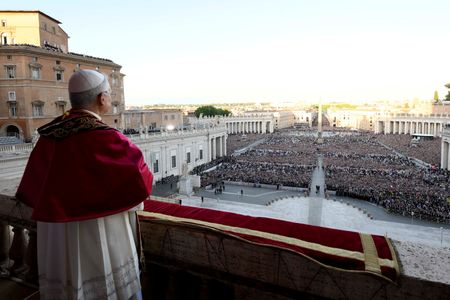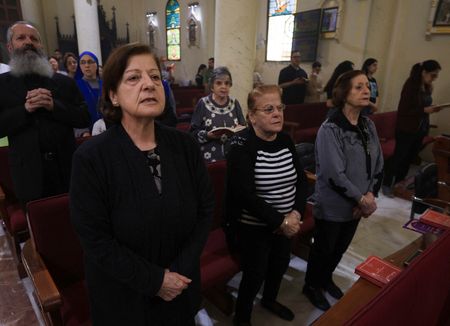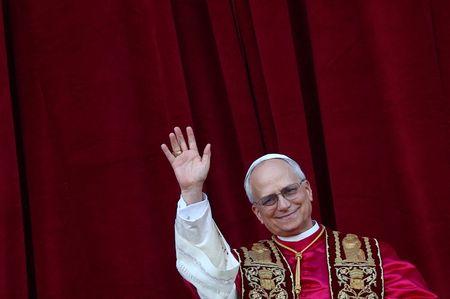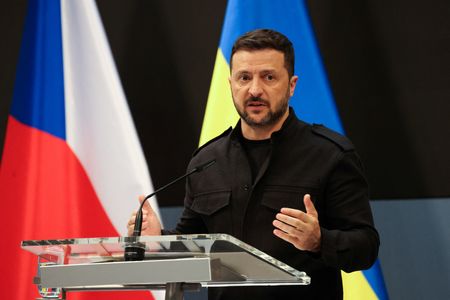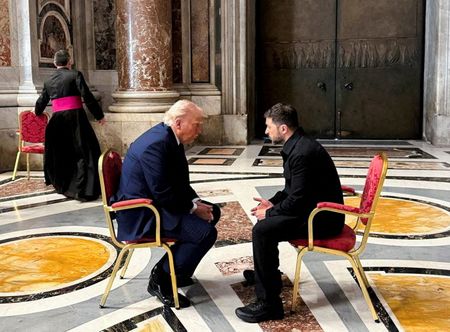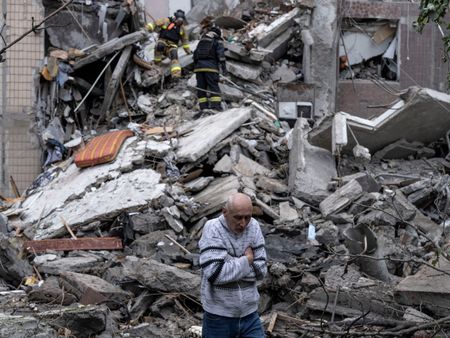By Joshua McElwee, Crispian Balmer and Philip Pullella
VATICAN CITY (Reuters) -Cardinal Robert Prevost, a long-time missionary in Latin America, was elected as the surprise choice to be the new leader of the Catholic Church on Thursday, becoming the first U.S. pope and taking the name Leo XIV.
Pope Leo appeared on the central balcony of St. Peter’s Basilica after white smoke billowed from a chimney atop the Sistine Chapel, signifying the 133 cardinal electors had chosen him as a successor to Francis, who died last month.
“Peace be with you all,” he told the cheering crowd, speaking in fluent Italian. He also spoke in Spanish during his brief address but did not say anything in English.
Prevost, 69 and originally from Chicago, has spent most of his career as a missionary in Peru and has dual Peruvian nationality. He became a cardinal only in 2023. He has given few media interviews and is known to have a shy personality.
President Donald Trump swiftly congratulated him on becoming the first U.S. pope. “What excitement, and what a Great Honor for our Country. I look forward to meeting Pope Leo XIV. It will be a very meaningful moment!”
However, the new pope has a history of criticizing Trump and Vice President JD Vance’s policies, according to posts on the X account of Robert Prevost.
Massimo Faggioli, an Italian academic who has followed the papacy closely, suggested the tenor of the Trump presidency might have influenced the cardinals to choose a pope from the U.S., who could directly rebut the president.
“The international upheaval of the rhetoric of the Trump presidency, paradoxically, made possible the impossible,” said Faggioli, a professor at Villanova University in the U.S.
“Trump has broken many taboos, the conclave now has done the same — in a very different key.”
PRAISE FROM PERU
The appointment was welcomed by the Peruvian president Dina Boluarte.
“His closeness to those most in need left an indelible mark on the hearts of Peru,” her office said in a post on X.
Prevost becomes the 267th Catholic pope following the death of Francis, who was the first from Latin America and who ruled for 12 years.
Francis had widely sought to open the staid institution up to the modern world, enacting a range of reforms and allowing debate on divisive issues such as women’s ordination and better inclusion of LGBT Catholics.
Leo thanked Francis in his speech and repeated his predecessor’s call for a Church that is engaged with the modern world and “is always looking for peace, charity and being close to people, especially those who are suffering”.
He had not been seen as a frontrunner and there was a brief moment of uncertainty when his name was announced to the packed St. Peter’s Square, before people started to clap and cheer.
“I’m just thrilled. I hope this can bring to America a more loving community. I think there’s a lot of hate in America. I think there’s a lot of racism. I have experienced it,” said Lailah Brown, 28, an African American from Seattle.
“I hope America does not embarrass the pope,” she said.
Unlike Francis, who spurned much of the trappings of the papacy from the day he was elected in 2013, Prevost wore a traditional red papal garment over his white cassock as he first appeared as Leo XIV.
SNAP, a US-based advocacy group for victims of clerical sex abuse, expressed “grave concern” about his election, renewing accusations that Prevost failed to take action against suspected predatory priests in the past in Chicago and in Peru.
“You can end the abuse crisis — the only question is, will you?” it said in a statement addressed to the new pope.
In an interview with the Vatican News website in 2023, Prevost said the Church must be transparent and honest in dealing with abuse allegations.
CHICAGO CELEBRATES
A crowd of clergy and staff members at Chicago’s Catholic Theological Union erupted in a joyful cheer as Pope Leo walked out onto the Vatican balcony, some four decades after he graduated from the South Side school.
It was an “explosion of excitement and cheers that went up in the room … many of us were just simply incredulous and just couldn’t even find words to express our delight, our pride,” said Sister Barbara Reid, president of the theology school.
Pope Leo graduated from the school in 1982 with a master’s degree. Reid called Leo intellectually brilliant, saying he has an extraordinarily compassionate heart.
“It’s an unusual blend that makes him a leader who can think critically, but listens to the cries of the poorest, and always has in mind those who are most needy,” she said.
THE NAME LEO
The last pope to take the name Leo led the Church from 1878-1903. Leo XIII was known for his devoted focus to social justice issues, and is often credited with laying the foundation for modern Catholic social teaching.
Prevost has attracted interest from his peers because of his quiet style and support for Francis, especially his commitment to social justice issues.
Prevost served as a bishop in Chiclayo, in northwestern Peru, from 2015 to 2023.
Francis brought him to Rome that year to head the Vatican office in charge of choosing which priests should serve as Catholic bishops across the globe, meaning he has had a hand in selecting many of the world’s bishops.
(Reporting by Joshua McElwee, Crispian Balmer, Philip Pullella, Alvise Armellini, Angelo Amante and Keith WeirAdditional reporting by Brendan O’Brien in ChicagoEditing by Frances Kerry and Deepa Babington)

